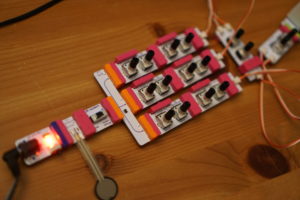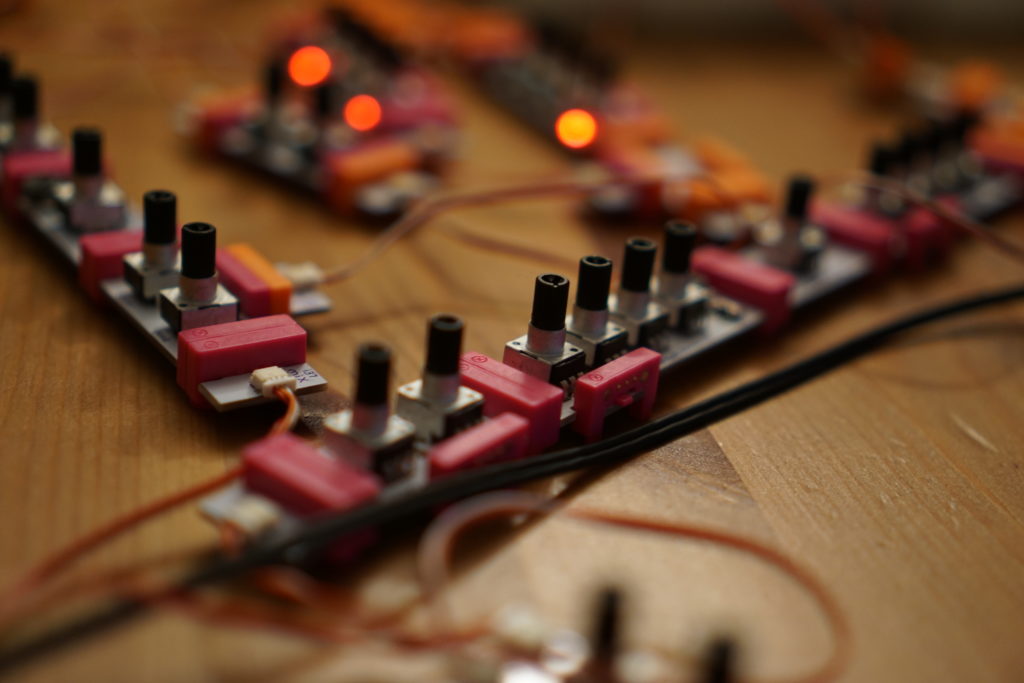Andrew Overfield speaks to Composer and Sound designer, Renaud Bédard. Renaud is a programmer and tinkerer who is currently working at Capybara Games in Toronto on Below, an upcoming PC and Xbox One title. He also much enjoys tweaking knobs on the KORG littleBits synth system on evenings and weekends, as well as attending the occasional game jam with friends from Les Collégiennes or other local peeps. He also writes a blog for the technically inclined, The Instruction Limit.
Full interview below:
Following on from my latest review of Magic Shot for iOS, I managed to get the chance to interview its composer and sound designer; Renaud Bédard.
Given that I’d been critical of the game, whilst still expressing a large portion of it’s highlights and good points, it was great to chat to Renaud about his process and workflow as a composer.
Hi Renaud and thanks for taking the time to chat to us, I can see that you’ve been very busy lately but we’ll get onto that part a little later.
Thanks for reaching out to me!
First of all, in researching you I found out a lot of info yet you tend to keep under the media radar. So tell our readers a little bit about yourself.
I’m 30 years old, originally from Montréal but now living in Toronto with my lovely partner Marie-Christine. I currently work at Capybara Games as a programmer on “Below” which is slated for release on Steam and Xbox One some time in the future… I am the new-ish dad of a 10 month old little boy called Octave. I (very rarely) write a tech blog called The Instruction Limit (http://theinstructionlimit.com). Oh and I have a chinchilla named Chocobo.
Composing music for video games, and composing in general. What got you into audio and the creation of music in the first place?
When I was in high school I used to take keyboard lessons… I wasn’t a very good student and never really learned the theory well, but got vaguely interested in writing short songs in a music sheet program called Encore (does that still exist?). It kind of died there and I didn’t do any music for a long time.
Then I got interested in chip music around 2006, hung out with chiptune artist 6955 and was fascinated by how he used wire-bent console hardware to produce his older music.
Shortly after I learned about modular synths, watched the Canadian documentary “I Dream of Wires” and started dreaming of getting an euro-rack kit… but I’m still a bit too intimidated to get into that.

So I heard of littleBits in early 2014, got really excited about the synth kit and ordered a ton of them over the course of a year (no regrets). I started posting little jam videos of me toying with them, as a way to track my progress and as a keepsake of the little melodies I created.
Then suddenly, two Frenchmen from England contacted me about scoring their iOS billiards game Magic Shot with littleBits. I assured them that I’m not an audio guy nor a musician by any stretch of the imagination, but they liked my jams and wanted exactly that as the backdrop for their game, so I obliged and had a lot of fun!
Is there a specific genre of game you’d say you prefer to work with the most, or is there anything that maybe you’d like to work on in the future?
Considering that Magic Shot is the only game I’ve ever done audio for, I don’t know that I have a specific preference for a genre yet! But I like reactive, dynamic audio that’s deeply tied in to game systems. Rich Vreeland (Disasterpeace) made a toy-game called January where the player goes around eating snowflakes falling from the sky, and each produces a note that forms musical patterns… it’s awesome to watch unravel. Proteus’s audio by David Kanaga is also outstanding. And Phosfiend Systems’ FRACT is another, you’re basically building up a synthesizer from the inside, with laser puzzles and sequencers. Those are not simple games to execute but they’re the kind of thing that would get me really excited about audio design.
I suppose no interview can go without mentioning the acclaimed FEZ! Tell us a about your involvement in the game and how you felt along the process leading up to release.

I was the only programmer on the game, and I was involved from the beginning (in April 2007). I was still pursuing a computer science degree in University when I started so this was my first real job, if you can call it that; and my first real game. It was a bumpy ride but I’m glad we all stuck through the hardships, because FEZ is something I’ll always be proud to showcase.
On the audio side, it was a really interesting experience working with Rich. Before he came onto the team, Phil and I had a basic design for what the music tracker would be like : we wanted the music to be atmospheric and sparse in most areas, but with building blocks that came into play depending on how deep you were into the world, or what time of day it was, etc. So the whole system was scriptable, and Rich could schedule tracks to become active or inactive based on a whole series of world variables. He used it in many surprising ways, with songs switching from rhythmic to loose, from minor to major depending on where or when you played. And in puzzle levels, the music was completely generative with tracks scheduled at uneven intervals, which is perfect for taking your time to solve a puzzle without being annoyed by repeating patterns.
We also had a level where the music was generated by platforms in the world toggling on or off, which meant level design had a direct impact on music. The level itself was already constructed when he came to score it, so he built the song out of the rhythm of the platforms… and it (Sync) is one of my favorite songs from the OST!
Do you prefer programming or composing? In Magic Shot you seemed to somewhat fuse the two together.
I just don’t have the same level of expertise composing as I do programming. I’ve been programming since I was in 6th grade, and I’m just starting to do music… So I still feel more comfortable with code. However it’s really liberating to tweak knobs, connect modules and end up with a melody without the involvement of a computer, I enjoy it a lot.
Arnaud and François asked me whether I wanted to write the code for Magic Shot’s music system, but I declined because I didn’t have time. François ended up writing the music tracker and I’m really happy with the result!
Moving onto Magic Shot, and your work with LittleBits. Firstly, what made you decide to use LittleBits? How do you feel it helped when creating the music?

The reason I used littleBits is because Nerial specifically asked me to use them in their game; they liked the lo-fi, minimalistic sound. But for me there’s really no other avenue, I don’t own other hardware synths and I’m not familiar with software ones. Working on the game was a great excuse to spend more time with littleBits and explore how they can be used for proper music tracking.
For people not used to composing music, littleBits is a great way to explore your creativity. It encourages moving things around, it’s very physical and the feedback is immediate.
It also forced me to get clever in order to get the results I wanted. I already owned the Arduino-programmable module, but had never found a good use for it before working on Magic Shot… One day I decided to make a simple script to do 3 time-divided outputs for a tempo oscillator, and it directed how I composed music for the game entirely. From that point it was really easy to make songs out of 3 or 4 tracks with different speeds, and that defined the sound of the game.
Would you say it distracted form the creative process or encouraged it?
There definitely are limitations that come with using littleBits (4-step sequencers, oscillators are free and not quantized to any scale, low audio quality, no way to save out settings and recall them, etc…), and compared to a proper workflow I’m sure it feels like an awkward toy. But to me, working with limitations is a great advantage, and allows me to come up with something that sounds good really fast. If I’m given too many options, especially in a system I don’t know well, I end up over-thinking and never produce anything good. Given the short production time and my inexperience with music-making, littleBits were perfect.
I understand in my Magic Shot review, I was very critical of the audio and trying to be as fair as I could. I really appreciated the way you embraced that criticism. Is there anything you’d possibly change for the game if you could, or potentially for a second installment?
It’s easy to come off a project with a sense that you did everything the best you could, and it’s just fine. I was actually happy to read an actually critical review that highlighted the obvious flaws and shortcomings of the game’s sound design! All the other reviews I seen said the music was “trippy” and called it a day.
On one hand I’m happy about the game’s audio as a newbie composer, but I realize that we didn’t make all the right calls.
In retrospect I also think the music is way too dense for a slow puzzle game. Even when few tracks are playing, it’s very dissonant and aggressive… I could’ve gone with softer synths, more space in the mix, and let the game’s sound effects take that space instead.
We considered redoing the ball collision and wind-up sound effects with littleBits but I decided to focus on music instead; since they’re the main interaction the player does, we definitely should’ve focused on that.
To finish off, I’m sure our readers are eager to find out what’s happening next. Where can we next see you out and about and is there any big news you want to share with us?
If you wanted to check out Magic Shot but you don’t own an iOS device, you’ll be pleased to know that it just came out on the Google Play store for Android devices!
I’ve been invited to perform a set of littleBits improvisational music at the Sonar music festival (June 18-20, http://sonarplusd.com/) in Barcelona, which is a huge honor and kind of insane. If you’re attending, come and say hi!
Otherwise, I’m still chugging along on Below at Capy. It’ll be awesome though.
Hope you enjoyed the interview! Check out Andrews’s Magic Shot Game Audio Review as well as more interviews at our Interviews page.
Links
Interview by Andrew Overfield
Edited by Sam Hughes
Uploaded 08/06/15
Like what we do? Don’t forget to sign up for the Newsletter!
To keep going and bring you even better and higher quality content (plus getting more awesome writers involved) we’ve set up a Patreon page!
We hope to continue giving back to the audio community and with a little support we can go a long way.
Whether you donate, share the link or just read the interviews we’re very happy you stopped by and psyched that you like our content!
Thanks a lot!
Sam – Lead Editor


